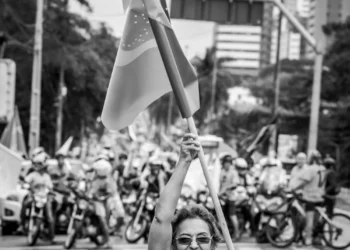Editor’s Note: This is the first of two parts for this post.
by Thomas Kestler, University of Würzburg
Translated and Reviewed by Matheus Lucas Hebling
Introduction
Jair Bolsonaro’s surprising rise to the presidency in 2018 was at first interpreted as an exception and as a consequence of the political and economic crisis in Brazil at this moment (Hunter & Power, 2019). Four years later, however, several other right-wing candidates have emerged, among them José Antonio Kast in Chile, Guido Manini Ríos and his party Cabildo Abierto in Uruguay, and Federico Gutiérrez in Colombia. By now, Bolsonaro appears less as an exception and more as part of a right-wing populist wave and a global backlash against libertarianism, universalism, and globalization (Cannon & Rangel, 2020; Haggard & Kaufman, 2021; Sanahuja & López Burian, 2021). He is frequently referred to as a kind of ‘tropical Trump’ and described as a Latin American specimen of radical right populism (RRP onwards) so far known mostly from Europe and North America (Luna & Rovira Kaltwasser, 2021; Zanotti & Roberts, 2021a).
The aim of this article is a typological assessment of Brazil’s Bolsonaro as a supposedly prototypical example of RRP to clarify the correspondence of this case with Mudde’s (2007, 2016a) criteria of RRP. If such a correspondence can be established, other cases like Kast, Manini Ríos, or Gutiérrez can be assessed on the same basis. To approach this issue, the concept of RRP is broken down along its parts into two dimensions, right-wing radicalism and populism, because both features can vary independently (Mudde, 2007, p. 31). Right-wing radicalism is defined by its position within the two-dimensional cleavage space and conceptually distinguished from the neighboring categories of conservatism and right-wing extremism. Populism is treated in line with Mudde as an ideological feature based on the antagonism between a “morally pure people” and a “corrupt elite.” Based on this conceptualization, the case of Bolsonaro is assessed qualitatively for its correspondence with the concept of RRP along the two dimensions of right-wing radicalism and populism.
In the following section, the concept of RRP is discussed in the Latin American context. Section three outlines the case of Bolsonaro in Brazil and its typological characteristics along the two dimensions of RRP. The article concludes with a summary and an outlook.
What does radical right-wing populism mean in the Latin American context?
Right-wing populism is a rather broad category, which includes different Latin American varieties such as authoritarian populism (Dix, 1978), so-called ‘punitive populism’ (Bonner, 2019), or neoliberal populism (Roberts, 1995). By contrast, RRP is a narrower category, and its application to Latin America is relatively recent. Mudde proposes a minimum definition of RRP based on the core feature of nativism, which he describes as “an ideology, which holds that states should be inhabited exclusively by members of the native group (‘the nation’) and that non-native elements (persons and ideas) are fundamentally threatening to the homogenous nation-state” (2007, p. 19). An essential element of nativism is ethnopluralism – “the notion that different cultures should not coexist in as much as each of them has a unique character that should be preserved and respected,” as Rueda (2021) puts it.
However, with a view to Latin America, this criterion needs to be revised. Nativism and ethnopluralism seem out of place in a region where the concept of a homogenous nation-state never took hold and where mestizaje is a cultural ideal. This is not to say that nativism has to be dropped as a definitional criterion for the Latin American far-right. There are notable ideological overlaps with the European and North American New Right, for example, concerning immigration, which is a controversial issue in South America. There are also offenses against ethnic and cultural minorities, and nationalist rhetoric is pervasive.
Nevertheless, nativism in Latin America is specific insofar as it is, so to say, inverted. Instead of the native population like Chile’s Mapuche or Brazil’s indigenous people, it exalts European immigrants’ society, evoking the 19th-century debate about the antagonism between ‘civilization’ and ‘barbarism.’ Thus, although the ideology of nativism and ethnopluralism does not fit the Latin American context, observable features in the cases under consideration can be regarded as functional equivalents, as suggested by Mudde (2016b).
To bring the criterion of nativism in line with the Latin American context, the notion of the natural order can serve as a common denominator and as an umbrella concept from which nativism, as well as other elements of rightist ideology, are derived. The concept of natural order exceeds the aspect of equality/inequality. It entails the idea of society’s natural or religious origin and a person’s essential rootedness in her social environment. The assumption of a natural order governing human relations is fundamentally antagonistic to the voluntaristic, egalitarian, and universalist ideas of the left, and it expresses itself in different forms, including not just the notion of natural hierarchies or inequalities among humans but also nationalism, religious fundamentalism, and communitarianism. Natural order, therefore, constitutes a higher-level concept that allows integrating nativism in Mudde’s terms and other ideological elements from the rightist menu, such as traditional ethical and religious values. Therefore, the concept of the natural order is better suited for dealing with RRP in Latin America than the narrower concepts of nativism and ethnopluralism.
Mudde also proposes a maximum definition of right-wing radicalism by adding the ideological features of authoritarianism and populism. In the context of right-wing ideology, radicalism describes a position between conservatism and right-wing extremism, defined by its degree of ideological rigidity. While conservatives are patriotic, right-wing radicals are nationalist; while conservatives are traditionalist, right-wing radicals are reactionary (Bobbio, 1996). Right-wing radicals accept democracy and popular sovereignty in principle, but unlike conservatives, they reject the pluralistic elements of liberal democracy. Extremists, by contrast, oppose the democratic system tout court and seek a revolutionary path of social change. This differentiation is also valid in the Latin American context.
Authoritarianism, in turn, requires further reflection because there are facets in its Latin American manifestations that differentiate it from most populist radical-right parties in Europe. Mudde’s definition of authoritarianism derives from Adorno and the notion of an authoritarian personality. Radical-right populists seek to appeal to such a personality type through a rhetoric of law and order and a policy of security and punishment of criminals. The corresponding kind of ‘tough on crime’ policy is also a typical feature of RWP in Latin America. However, its roots are different, and it usually involves strong militarist undertones, which are largely absent in the European radical right. The main difference lies in the Latin American history of military rule and the continuing salience of the transformation cleavage between democratic reformers and victims of the past dictatorship on the one side and supporters, nostalgics, and beneficiaries of the authoritarian regime, on the other (Pereira, 2005). Another specificity is that insecurity in Latin America is a pressing issue for many people – not just a question of personality and subjective perceptions, as in most cases of right-wing party supporters in Europe (Cafferata & Scartascini, 2021). Thus, authoritarianism in Latin America is not primarily a question of attitudinal predispositions, but the historical and social context somewhat conditions it.
Together, nativism, radicalism, and authoritarianism constitute the right-wing dimension of RRP, which can be described as an area within the well-known two-dimensional cleavage space (Bornschier, 2010). Right-wing radicalism represents the cultural backlash against libertarian and universalist values located on the lower side of the cultural cleavage axis. In contrast, its position on the horizontal economic cleavage axis is of secondary importance (Mudde, 2007: 21, 22). On economic issues, a position closer to the state or the market is compatible with RRP.

Right-wing radicalism, however, is not necessarily at the same time populist. Populism is not bound to a political ideology and cannot be pinned down to a specific position within the cleavage space. According to Mudde (2004), the definitional core of populism is constituted by the notion of antagonism between two homogeneous and antagonistic groups, ‘the pure people’ versus ‘the corrupt elite.’ The exaltation of the pure people entails an identity, a Rouseauian view of democracy, and the idea of a ‘general will’ represented by the populist party or leader. Beyond that ‘thin-centered’ ideological core, populism is highly versatile in ideological terms, even within individual cases.
Populism, therefore, is not bound to a specific position within the cleavage space, but it rather constitutes its dimension, which has to be assessed separately, according to Mudde’s definition of populism as a thin-centered ideology based on the antagonism elite vs. the people.[1] For assessing the degree of populism, the presence and quality of corresponding motifs – references to the morally pure people, the vilified elite, and the idea of popular sovereignty embodied by the populist leader – have to be examined. Although the primary category of a ‘self-serving elite’ is observable in all cases of populism, there is a considerable variation in its concrete expression, which needs to be factored in when assessing cases of RWP in Latin America.
References
BBC. (2021). Brazil’s Bolsonaro: Only God will remove me from power. https://www.bbc.com/news/world-latin-america-58479028
Berlet, C., & Lyons, M. N. (2000). Right-Wing Populism in America: Too Close for Comfort. Guilford Press.
Bobbio, N. (1996). Left and Right: The Significance of a Political Distinction. University of Chicago Press. http://www.loc.gov/catdir/description/uchi052/96026392.html
Bonner, M. D. (2019). Tough on Crime: The Rise of Punitive Populism in Latin America. Pitt Latin American series. Univ. of Pittsburgh Press.
Bornschier, S. (2010). Cleavage Politics and the Populist Right: The New Cultural Conflict in Western Europe. The social logic of politics. Temple Univ. Press.
Bülow, M. v., & Abers, R. N. (2022). Denialism and Populism: Two Sides of a Coin in Jair Bolsonaro’s Brazil. Government and Opposition, 1–19. https://doi.org/10.1017/gov.2022.14
Cafferata, F. G., & Scartascini, C. (2021). Combating Crime in Latin America and the Caribbean: What Public Policies Do Citizens Want? IDB.
Cannon, B., & Rangel, P. (2020). Resurgimiento de la derecha en América Latina: Nuevas coaliciones y agendas. Revista CIDOB D’afers Internacionals(126).
Dix, R. H. (1978). The Varieties of Populism: The Case of Colombia. The Western Political Quarterly, 31(3), 334. https://doi.org/10.2307/447734
Doyle, D. (2011). The Legitimacy of Political Institutions: Explaining Contemporary Populism in Latin America. Comparative Political Studies, 44(11), 1447–1473. https://doi.org/10.1177/0010414011407469
Gamboa Gutiérrez, L. (2019). El reajuste de la derecha colombiana. El éxito electoral del uribismo. Colombia Internacional(99), 187–214. https://doi.org/10.7440/colombiaint99.2019.07
Giordano, V. (2014). ¿Qué hay de nuevo en las ‘nuevas derechas’? Nueva Sociedad(254).
Haggard, S., & Kaufman, R. (2021). Backsliding: Democratic Regress in the Contemporary World. Cambridge Elements Elements in political economy. Cambridge University Press.
Hunter, W., & Power, T. J. (2019). Bolsonaro and Brazil’s Illiberal Backlash. Journal of Democracy, 30(1), 68–82. https://doi.org/10.1353/jod.2019.0005
Hunter, W., & Vega, D. (2021). Populism and the Military: Symbiosis and Tension in Bolsonaro’s Brazil. Democratization, 1–23. https://doi.org/10.1080/13510347.2021.1956466
Kestler, T. (2022). Radical, Nativist, Authoritarian—Or All of These? Assessing Recent Cases of Right-Wing Populism in Latin America. Journal of Politics in Latin America. Advanced online publication. https://doi.org/10.1177/1866802X221117565
Levitsky, S., & Loxton, J. (2012). Populism and Competitive Authoritarianism: The Case of Fujimori’s Peru. In C. Mudde & C. Rovira Kaltwasser (Eds.), Populism in Europe and the Americas: Threat or Corrective for Democracy? (pp. 160–181). Cambridge Univ. Press.
Luna, J. P., & Rovira Kaltwasser, C. (2021). Castigo a los oficialismos y ciclo político de derecha en América Latina. Revista Uruguaya De Ciencia Política, 30(1). https://doi.org/10.26851/RUCP.30.1.6
March, L. (2017). Left and Right Populism Compared: The British Case. The British Journal of Politics and International Relations, 19(2), 282–303. https://doi.org/10.1177/1369148117701753
Mudde, C. (2004). The Populist Zeitgeist. Government and Opposition, 39(4), 541–563. https://doi.org/10.1111/j.1477-7053.2004.00135.x
Mudde, C. (2007). Populist Radical Right Parties in Europe. Cambridge Univ. Press. https://doi.org/10.1017/CBO9780511492037
Mudde, C. (Ed.). (2016a). Extremism and Democracy. The Populist Radical Right: A Reader. Taylor and Francis. http://gbv.eblib.com/patron/FullRecord.aspx?p=4710543
Mudde, C. (2016b). The Study of Populist Radical Right Parties: Towards a Fourth Wave. Working Paper Series. https://www.sv.uio.no/c-rex/english/publications/c-rex-working-paper-series/Cas%20Mudde:%20The%20Study%20of%20Populist%20Radical%20Right%20Parties.pdf
Pappas, T. S. (2020). Modern Populism: Research Advances, Conceptual and Methodological Pitfalls, and the Minimal Definition. In H. E. Vanden & G. Prevost (Eds.), The Oxford Encyclopedia of Latin American Politics. Oxford Univ. Press. https://doi.org/10.1093/acrefore/9780190228637.013.17
Pereira, A. W. (2005). Political (In)justice: Authoritarianism and the Rule of Law in Brazil, Chile, and Argentina. Pitt Latin American series. Univ. of Pittsburgh Press.
Roberts, K. M. (1995). Neoliberalism and the Transformation of Populism in Latin America: The Peruvian Case. World Politics, 48(Oktober), pp. 82–116.
Rueda, D. (2021). Alain de Benoist, ethnopluralism and the cultural turn in racism. Patterns of Prejudice, 55(3), 213–235. https://doi.org/10.1080/0031322X.2021.1920722
Sanahuja, J. A., & López Burian, C. (2021). Latin American Neo-Patriot Far-Right: Between the Crisis of Globalisation and Regional Political Processes. In G. Pereyra Doval & G. Souroujon (Eds.), Routledge studies fascism and the far right. Global Resurgence of the Right: Conceptual and Regional Perspectives (pp. 98–122). Routledge.
Stuenkel, O. (2021, November 1). To Stop Bolsonaro, the Opposition Must Unite. Foreign Affairs. https://www.foreignaffairs.com/articles/brazil/2021-11-01/democracy-dying-brazil
Tamaki, E. R., & Fuks, M. (2020). Populism in Brazil’s 2018 General Elections: An Analysis of Bolsonaro’s Campaign Speeches. Lua Nova(109), 103–127. https://doi.org/10.1590/0102-103127/109
Zanotti, L., & Roberts, K. M. (2021a). (Aún) la excepción y no la regla: La derecha populista radical en América Latina. Revista Uruguaya De Ciencia Política, 30(1). https://doi.org/10.26851/RUCP.30.1.2
Zanotti, L., & Roberts, K. M. (2021b, September 12). Las Limitaciones estructurales de la derecha populista radical en América Latina. Agenda Pública. https://agendapublica.es/las-limitaciones-estructurales-de-la-derecha-populista-radical-en-america-latina/
[1] This ideological approach to populism is not uncontested. The concept of populism is used in so many different ways that it risks losing its discriminatory value. For a discussion of the main approaches, see Pappas (2020); for the problem of measuring populism, see, e.g., March (2017).
Kestler, Thomas. 2023. "Right Wing Populism in Latin America". Brazilian Research and Studies Blog. ISSN 2701-4924. Vol. 3 Num. 1. Available at: https://www.bras-center.com/right-wing-populism-in-latin-america/, accessed on: January 26, 2026.








